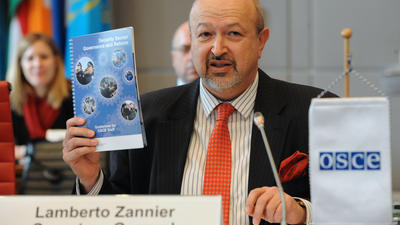-
Our work
-
Fields of work
- Arms control
- Border management
- Combating trafficking in human beings
- Conflict prevention and resolution
- Countering terrorism
- Cyber/ICT Security
- Democratization
- Economic activities
- Education
- Elections
- Environmental activities
- Gender equality
- Good governance
- Human rights
- Media freedom and development
- Migration
- National minority issues
- Policing
- Reform and co-operation in the security sector
- Roma and Sinti
- Rule of law
- Tolerance and non-discrimination
- Youth
- Field operations
- Projects
-
Meetings and conferences
- Summit meetings
- Review Conferences
- Ministerial Council meetings
- Plenary meetings of the Permanent Council
- Plenary Meetings of the Forum for Security Co-operation
- Security Review Conferences
- Annual Implementation Assessment Meetings
- Economic and Environmental Forum
- Economic and Environmental Dimension Implementation Meetings
- Human rights meetings
- Media conferences
- Cyber/ICT security conferences
- Conference of the Alliance against Trafficking in Persons
- Gender equality conferences
- Annual OSCE Mediterranean conferences
- Annual OSCE Asian conferences
- Partnerships
-
Fields of work
-
Countries
- All
-
Participating States
- Albania
- Andorra
- Armenia
- Austria
- Azerbaijan
- Belgium
- Belarus
- Bosnia and Herzegovina
- Bulgaria
- Canada
- Croatia
- Cyprus
- Czechia
- Denmark
- Estonia
- Finland – OSCE Chairpersonship 2025
- France
- Georgia
- Germany
- Greece
- Holy See
- Hungary
- Iceland
- Ireland
- Italy
- Kazakhstan
- Kyrgyzstan
- Latvia
- Liechtenstein
- Lithuania
- Luxembourg
- Malta
- Moldova
- Monaco
- Mongolia
- Montenegro
- The Netherlands
- North Macedonia
- Norway
- Poland
- Portugal
- Romania
- Russian Federation
- San Marino
- Serbia
- Slovakia
- Slovenia
- Spain
- Sweden
- Switzerland
- Tajikistan
- Türkiye
- Turkmenistan
- Ukraine
- United Kingdom
- United States of America
- Uzbekistan
- Asian Partners for Co-operation
- Mediterranean Partners for Co-operation
-
Structures and institutions
- Chairpersonship
-
Secretariat
- Secretary General
- Office of the Secretary General
- Conflict Prevention Centre
- Transnational Threats Department
- Office of the Special Representative and Co-ordinator for Combating Trafficking in Human Beings
- Office of the Co-ordinator of OSCE Economic and Environmental Activities
- Gender Issues Programme
- Opportunities for Youth
- Department of Human Resources
- Department of Management and Finance
- Office of Internal Oversight
- Documentation Centre in Prague
- Institutions
-
Field operations
- Presence in Albania
- Centre in Ashgabat
- Programme Office in Astana
- Programme Office in Bishkek
- Mission to Bosnia and Herzegovina
- Programme Office in Dushanbe
- Mission in Kosovo
- Mission to Moldova
- Mission to Montenegro
- Mission to Serbia
- Mission to Skopje
- Project Co-ordinator in Uzbekistan
- Closed field activities
- Parliamentary Assembly
- Court of Conciliation and Arbitration
- Organizational structure
- About us
Press release
OSCE launched guidelines on security sector governance and reform

- Date:
- Place:
- VIENNA
- Source:
- OSCE Secretariat
VIENNA, 6 April 2016 – A new OSCE publication intended to promote a comprehensive approach to security sector governance and reform was launched yesterday at an event in Vienna hosted by the OSCE Group of Friends of Security Sector Governance and Reform. The launch was chaired by Ambassador Ol’ga Algayerova, Permanent Representative of the Slovak Republic to the International Organizations in Vienna, who chairs the Group.
Presenting the publication, OSCE Secretary General Lamberto Zannier stressed that these guidelines marked a milestone in the OSCE’s engagement in the security sector. “This will ultimately help us to pursue a more coherent and co-ordinated approach, by supporting nationally led security sector governance and reform processes”, he said.
“Security Sector Governance and Reform: Guidelines for OSCE Staff” is designed to serve as a practical tool to help make the OSCE’s ongoing efforts in this field more sustainable by cutting across the politico-military, the economic and environmental and the human dimensions.
The Guidelines emphasize the importance of identifying synergies across these dimensions so that security sector governance and the reform process adhere to democratic principles. They also stress the need for parliamentary oversight of the security sector as well as informal oversight by civil society, including the media, and gender equality and human rights in the security sector.
UN Assistant Secretary-General for Rule of Law and Security Institutions in the Department of Peacekeeping Operations Dmitry Titov highlighted the importance of co-operation among international and regional organizations in this area. “We are convinced that this pragmatic set of technical – yet also very political – documents will help OSCE participating States enhance transparency and professionalism, while providing the basis for Europe- and OSCE-wide standards in security sector governance.”
Michael Georg Link, Director of the OSCE Office for Democratic Institutions and Human Rights, said: “OSCE participating States have agreed that the role of the security sector is not only to defend state interests, but also to protect its citizens and address threats to human security. Upholding human rights and fundamental freedoms makes for more effective, responsive, accountable and transparent security sector institutions.”
Many practical examples and lessons learnt from OSCE field operations enrich the Guidelines. Head of the OSCE Centre in Bishkek Sergey Kapinos highlighted these valuable insights and contributions and emphasized the importance of implementing approaches to security sector governance and reform that are tailor-made for specific contexts. He also recommended careful consideration of factors that may undermine national efforts in this field and the need to cultivate the political will of the host country to engage effectively in this process.